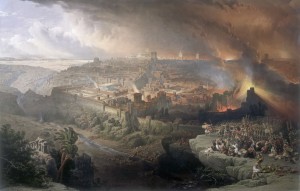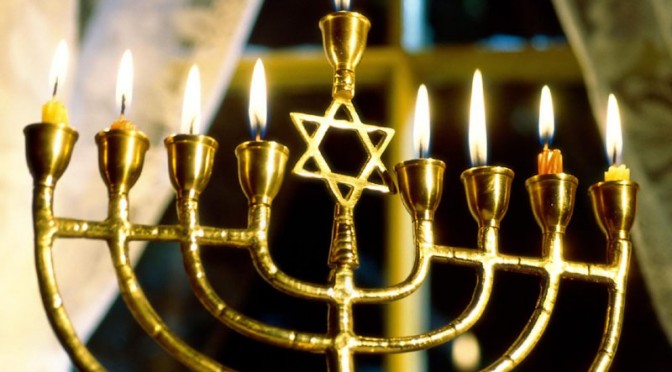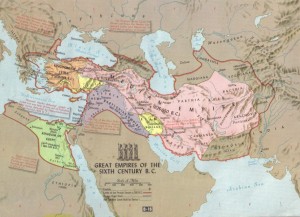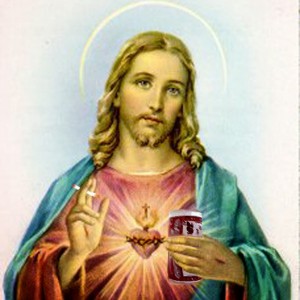The Holiday Season, a time when multiple religions and cultures come together to say “it’s too damn cold, we need to distract ourselves.” From the most ancient times to the modern day, everyone finds a reason to feast, celebrate, and sit close to fires of one form or another in the dead of winter. Since civilization itself was formed, we’ve found reasons to be happy at a time when the world tends to be pretty bleak. And don’t let the angry people on TV fool you, that’s the reason we say “Happy Holidays” instead of just Merry Christmas – this time of year is full of them.
But we often don’t know too much about the Holidays that are happening around us besides Christmas. Even there, as I’ve discussed in the past, we aren’t too clear on all the details. Why do we care about mistletoe? What exactly is Kwanzaa? Why are the Jewish people lighting a Menorah for 8 nights? Honestly, most of us only have passing understanding of any of these.
So today (and the next couple weeks), I intend to tackle one of these as a bit of a Mythology Monday, Alternative Mythologies, and general history mashup. ‘Tis the season, after all, and I intend to at least give it the nod. As of this writing those Menorahs are about to get lit, so it’s only fitting that I start with the ancient (but only recently important) festival of lights…
Hanukkah

One of the most commonly known Jewish celebrations in the west, Hanukkah (and many other spellings) is a holiday that we gentiles generally don’t understand. What we know of it is that it involves lighting a Menorah, it lasts for 8 days around November through December, and it’s about some oil lasting for longer than it was supposed to. Beyond that the best we understand of it comes from a song about dreidels, a shitty Adam Sandler animated movie, and a litany of Jewish comedians who have to explain to people what latkes are.
So it’s hard for us to understand just what exactly is important about the holiday. In fact, a lot of people didn’t really acknowledge it for a long time. Though celebrated in a lower key fashion since antiquity, the modern observance of Hanukkah was really born out of the actions of an Orthodox Rabbi named Menachem Mendel Schneerson (a man also involved in establishing the Department of Education). Schneerson, also known as “the Rebbe”, promoted the use of Hanukkah as a means of re-establishing the roots of the Jewish people in the 1970s. And today many believe that the popularization of the festival in the west was a reaction to the need to maintain cultural identity in a society that, let’s face it, turns Christmas into a 2 month long frantic media bombardment.
But the history is not one that should only be important to the Jewish people. Given the roots of the holiday, while we only understand that it was about a miracle involving oil, the outcome of this single event could have profoundly changed history for the last two thousand years for everyone and not just the Jews. For you see, the story of Hanukkah is essentially the story of how Abrahamic religions avoided becoming a footnote in history. Without the story of Hanukkah there may not have actually been a Christianity at all. And it all starts with a very poor real estate decision.
In the modern day we often associate Jerusalem and the region around it with Holy Wars and squabbles between the Abrahamic religions, but even in the ancient times it was a hotbed of conflict. The reason was simple but unfortunate. While relatively unassuming in terms of resources and comfort, the ancient Kingdom of Judah and all countries and territories to follow had what could be considered the worst location ever imagined. Positioned in a piece of land that sat between the Hellenistic empires of Europe, the Persian empires of Asia, and the various Egyptian kingdoms of Africa – Judah was in a constant state of crossfire. It was literally impossible not to get invaded repeatedly in short order. The only thing fought over more often than the Levant is how you pronounce “gif”.
This cycle continued for some time for the Kingdom of Judah until (then under control of the Babylonians) the tributary king Zedekiah decided that he was going to try to go for the gold. Deciding to side with the Egyptian Pharaoh against the Babylonians, Zedekiah rebelled against King Nebuchadnezzar of Babylon. Essentially giving the 6th Century BC version of the finger to one of the most powerful civilizations of the era – Zedekiah soon regretted it after Jerusalem ended up being besieged for some time before the walls were busted down. Ironically, this outcome should have been obvious to Zed, since the same damn thing happened 10 years prior. Essentially, the lesson learned here was that you don’t appoint a 21 year old to run your country even back when the life expectancy was 30.

However, having had enough of Judah’s shit, Nebuchadnezzar decided to just destroy the place and kick the people out. Knocking down the walls, razing the city, leveling their temple and, hell, let’s say kicking their puppies – the Babylonians ensured that there was no kingdom left to rebel against them this time. The people were exiled and sent scattering to neighboring regions. Some were sent to Babylon, others fled to Egypt, but few were allowed to stay.
Mind you, in the time of these events, the general belief was that every country’s gods were not only real but in competition. Every battle, every war, and every invasion was a test of one religion against another with the winner coming out with bragging rights. Much like schoolyards, every conflict was essentially “my god can beat your god” and Yahweh had suffered repeated humiliation. In essence, being Jewish in antiquity was much like being a fan of the Detroit Lions – you lose a lot, but you still hold out hope for next time.

So it comes as no surprise that these people, scattered through neighboring countries, no home to return to or temple to worship in, found themselves suffering a crisis of faith and identity. The period known as the Second Temple era was a time when the Jewish people weren’t exactly sure of their place in the world anymore. Maybe it would just be easier to join another culture, become like them and start worshiping their gods instead. Maybe it would be safer to side with one of the other cultures so there would be someone to always turn to.
And that’s what caused the rise of “Hellenistic Jews” over the next couple centuries. It became a popular idea within the Jewish culture to start siding with the Hellenistic cultures of Europe. They supported the idea of converting to worship of the likes of Zeus, adopting the customs of Greece and Italy, and even lifting old laws they’d followed for generations. After finally being able to return and erect the Second Temple of Judaism in Jerusalem, it was felt that such sentiments were dangerous to maintaining identity in these troubled times. The Tobiads, particularly vocal supporters of Hellenism, were banished from the region and sent to Syria. Once there, the Tobiads approached the rulers of the Seleucid Empire of Syria and suggested that, perhaps, it was time to invade them again.
After all, it’d been at least a week since the last invasion.

The irony was that, only a few years before, Jerusalem had been invaded by the same empire under Antiochus III the Great, conquered, and allowed to keep praying to Yahweh as a means of preventing rebellion. But with a new generation and a new king, the Tobiads managed to convince the current king of Seleucid, Antiochus IV Epiphanes, that it was time to force the country into Hellenizing. Jerusalem was once again attacked, reconquered, and had an altar to Zeus erected in the Second Temple of Judaism. Sacrifices were made to Zeus on the grounds once claimed by Yahweh, including sacrificial pigs which tainted the temple in the eyes of the Jewish people. Once again, Judaism was losing its temple to an invading force.
But then they stood up and revolted. Drawing a line in the sand, the people of Jerusalem fought back and drove out the invaders under the leadership of a Jewish Priest named Mattathias. The fight was long and hard, lasting for two years as they tried to fight off a superior force, and Mattathias was unable to see it through to the end, passing and leaving leadership in the hands of his son Judah. But as it came to an end they reclaimed the city and their temple and Judah became known as Judah the Hammer.

But the temple had been defiled, used for unclean sacrifices for a couple of years and rendered impure by the actions of the Seleucid. Judah declared that it would be cleansed and rededicated in the proper fashion as soon as possible, and the Jewish people set out to reclaim their temple. However, there was a problem – the one everyone knows now – there was only enough oil to last for a single day.
The oil wasn’t simple lamp oil but rather a kosher olive based oil which needed to be blessed and then sealed by the high priest. The process of doing this would take eight days, and unfortunately the flask they found was only enough oil to last for one. It looked like their rededication of the temple was going to end before it even had a chance to begin. For a religion that had spent centuries being kicked in the teeth and was already beginning to show wear in the face of constant sieges from the outside, this was the sort of event that would have rendered their victory moot.
After all, if God was really on their side, he would have done something by now, right?
Still, not one to give up (dude was called The Hammer!) Judah went forward with the ceremonies, rededicated the temple, and began the festival of Hanukkah. Maybe the oil would run out after the first day, but it wasn’t in Judah to give up. And then, the oil continued to burn on. After centuries of being invaded, exiled, having their faith put in question, and having to fight to get back their homeland – their faith was finally rewarded. That oil lasting long enough for the new oil to be prepared was the first real sign they’d had in a long time that they weren’t alone.
Was it really a miracle? Did someone substitute in other oil without telling anyone? Was there just more oil there than they initially reported? In the end it doesn’t really matter as much as the result. For the first time in a very long time, the Jewish people had a win. The Lions finally went to the Superbowl. And because of this, not very long later, a Jewish man was born who ended up founding another religion that would go on to shape the world.
Would Jesus have been as big a deal if there wasn’t an organized, unified Judaism at the time of his birth? It’s hard to tell. But what we can know for certain is that the event celebrated this week is one that, despite being frequently marginalized, turned out to be a pivotal moment in history. Had the Tobiads and others like them been able to win and hold Jerusalem for longer, we may not have the same culture we do today. Good or bad, however you feel about the culture we have now, you have to admit…
It probably deserves better recognition than this.
(I write novels. A Happy Hanukkah to all those who celebrate it and Happy Holidays to everyone else. Next week, Mistletoe! In the meantime, don’t forget to follow my twitter account.)










